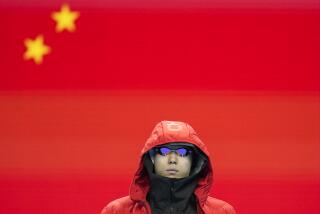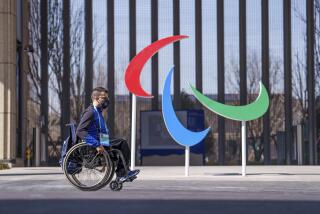Chinese Swimmers Banned From Meet : Swimming: Protesting drug abuse, Pan-Pacific Swimming Assn. votes not to invite China to its championships in Atlanta.
- Share via
In one of the strongest anti-doping actions ever taken, China was banned Sunday from the Pan-Pacific Swimming Championships.
Meeting in Honolulu, the Pan-Pacific Swimming Assn. charter members--Australia, Canada, Japan and the United States--voted 3-1 not to invite China to their meet in Atlanta this August.
The decision was fueled in part by the recent spate of positive drug tests of Chinese athletes, including seven swimmers. Of 13 positives since October’s Asian Games, 12 were for a potent anabolic steroid, dihyrodtestosterone. The male hormone, which helps promote muscle mass, was previously undetected.
The worldwide swimming community also was particularly sensitive to the drug issue because it did little when East Germany’s women dominated the sport through the 1980s.
Its reaction to the Chinese women, who won 12 of 16 titles at last September’s World Championships, has been much more vocal.
“It’s very extreme,” Ray Essick, executive director of U.S. Swimming, said of the ban. “After our experience with the GDR (East Germany), we believe we just cannot allow that to repeat itself.”
After the end of the Cold War, details of East Germany’s state-sponsored, systematic drug program were revealed. It also has been noted that East German coaches and trainers have spent considerable time in China working with its swimmers. As late as 1989, Chinese athletes and coaches were seen training in East Germany.
Still, China’s sports leadership maintains it is firmly opposed to drug use and takes strong action against athletes and coaches who disobey the rules. In the past, coaches have attributed the successes of Chinese women in swimming, running and weight lifting to special diets.
“China has now been reflecting and regretting,” said Japan’s Shinji Higashimija, who cast the lone dissenting vote Sunday. “We should still be open to China. We would like to give one more chance to China, but no more.”
But the other Pan-Pacific members did not show the same faith in China’s word.
“Hiding behind rationales that herbal teas are involved tests people’s patience,” said David Johnson, national director of Swimming Canada. “People are fed up with being bamboozled.”
Added Forbes Carlile, director of the Australian Swim Coaches Assn.: “Damn international politics. We’ve got to get rid of them until they do the right thing.”
More to Read
Go beyond the scoreboard
Get the latest on L.A.'s teams in the daily Sports Report newsletter.
You may occasionally receive promotional content from the Los Angeles Times.






